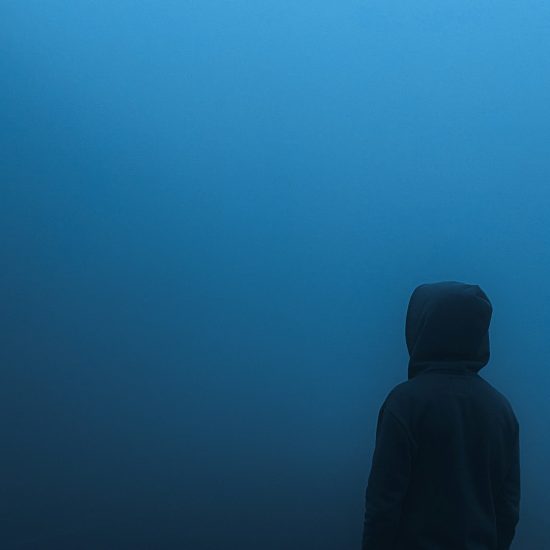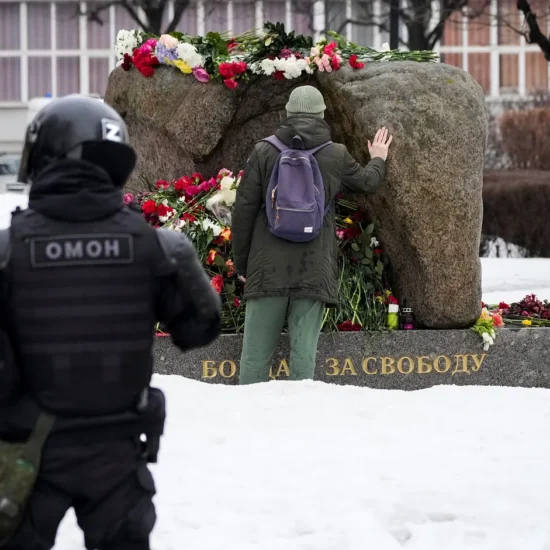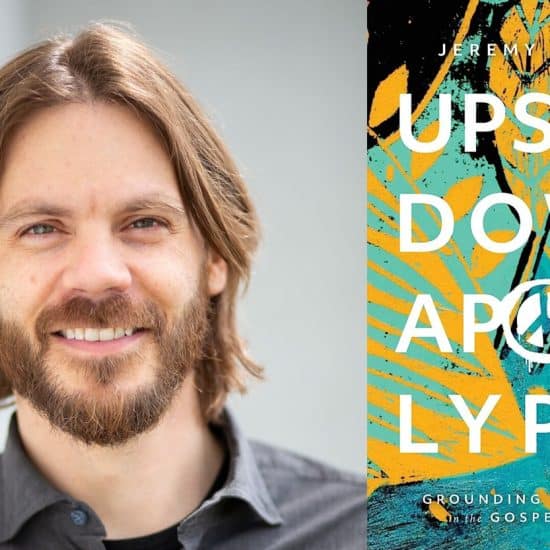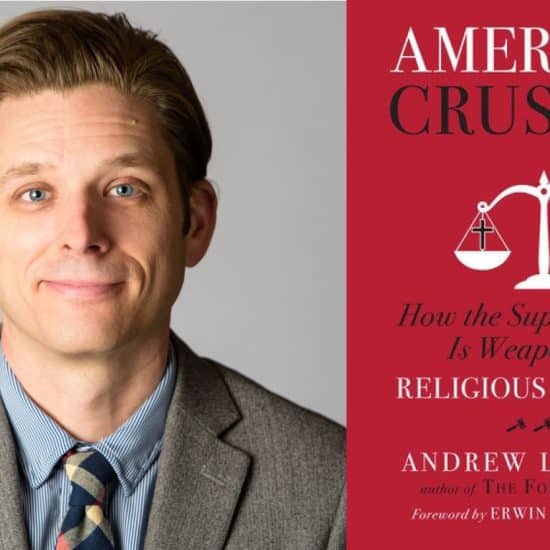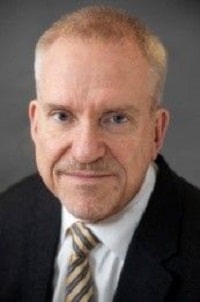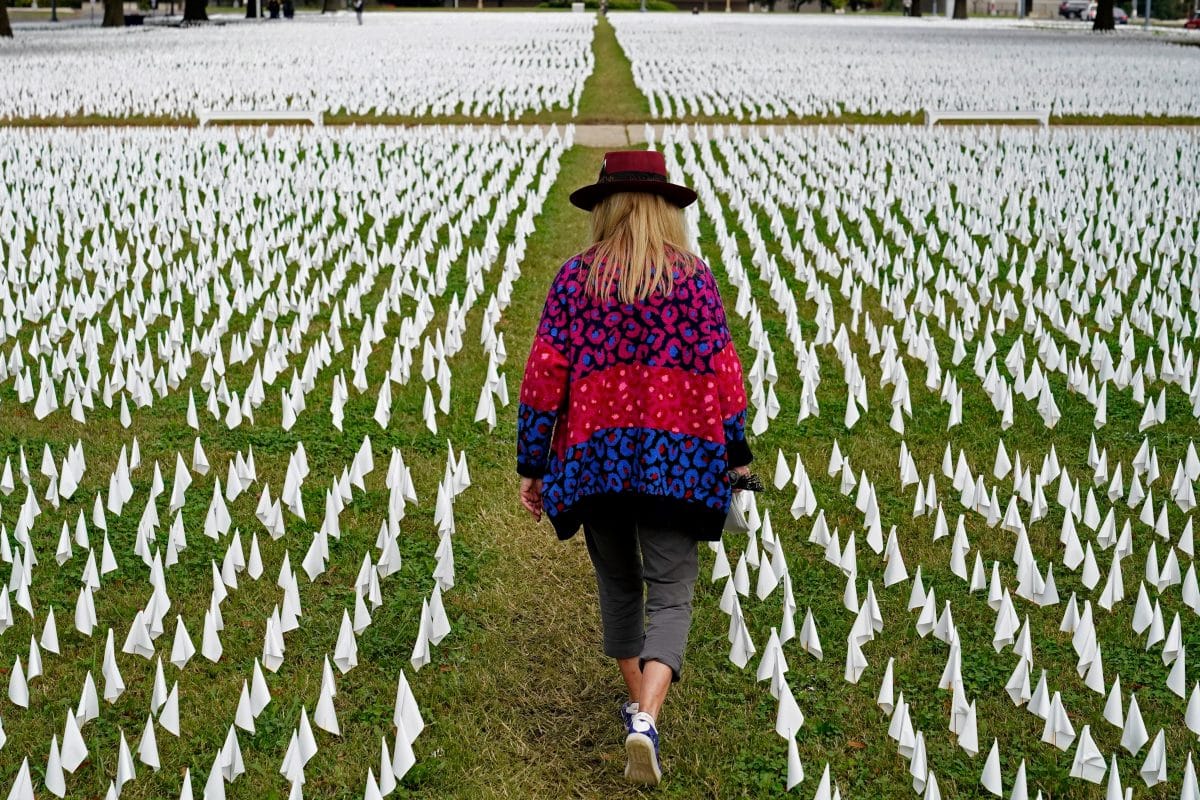
(RNS) — President Biden’s national speech on Thursday (March 11), the one-year anniversary of COVID-19 being declared a pandemic by the World Health Organization, helped our country to recognize his difficult milestone.
Prior to the pandemic it was common practice for faith communities to gather in person to find solace — filling their buildings, taking to the streets, or mobilizing in public squares. Public days and gatherings have served throughout history as a powerful sign of solidarity and hope and as a way to make meaning of tragic anniversaries and events.
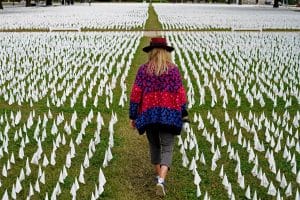
In this Oct. 27, 2020 photo, Artist Suzanne Brennan Firstenberg walks among thousands of white flags planted in remembrance of Americans who have died of COVID-19 near Robert F. Kennedy Memorial Stadium in Washington, D.C. (Patrick Semansky/Associated Press)
Part of the challenge of mourning our nearly 600,000 dead has been honoring them while upholding social distancing recommendations.
In collaboration with the Humanitarian Disaster Institute at Wheaton College, VOMO, World Vision, and other partners, we recently launched National COVID-19 Day. The purpose of this day is to help the United States navigate our collective grief, encourage one another and embrace hope for what is ahead.
On March 11, HDI also helped lead the 2nd Annual Spiritual First Aid Summit with Food for the Hungry in collaboration with International Justice Mission. Lastly, HDI and the National Association of Evangelicals have partnered on a COVID-19 Memorial Service to help mark this historic anniversary.
Based on our experiences of helping others through difficult milestones, as well as helping organize the aforementioned public events, we share ways such days can help us to heal.
Public days facilitate lament
Most religious traditions bear witness to the importance of lament, for individuals and for communities when facing hardships.
When tragedy strikes it can be tempting to rush past the confusion, pain, and loss in an attempt to assure ourselves and others that God has a plan. And while people of faith believe in, and have personally experienced, God’s redemption in the midst of suffering, the reality is that for thorough and authentic healing, people need space to lament.
When communities come together to name and grieve a shared loss, the whole community is strengthened and rooted in our tradition.
Public days help us find meaning and hope in our suffering
Two days after a brutal workplace shooting in the Chicago suburb of Aurora, where five were killed and six were injured, more than 1,000 people attended a prayer vigil at the Henry Pratt Company plant, filling a street near the building where the shooting occurred.
The Rev. Dan Haas began the service with words of the 34th Psalm, “The LORD is close to the brokenhearted and saves those who are crushed in spirit.” He reminded those present of God’s steadfast faithful love that is poured out in a particular way on those who have endured suffering. In the wake of crises, people often struggle to make sense of God’s presence or absence in the midst of chaos, and gathering can remind people that God is near.
Public days give us a way to remember those we’ve lost
Expressions of public faith can be powerful healing sources of memorial and remembrance. Community activities such as prayer vigils are another common way to show support to those affected.
After 9/11, University of Denver researcher D.N. McIntosh and his colleagues looked at a national sample of nearly 900 participants from across the United States. They found that participation in religious social structures helped to buffer against mental and health problems.
People still gather near the locations where the 9/11 attacks took place to honor those who died by reading the names of each person in between moments of silence. Every victim is identified and prayed for by name. By noticing and honoring them, we are reminded that the lives that had been lost mattered.
For a disaster like COVID-19 that has unfolded over more than a year, it is important that we have a day to mark this together.
Public days help us honor our whole story
When the 2010 earthquake hit Haiti, many people lost their lives in a church in Port-au-Prince that was full at the moment the tremblor began. All that was left of the building was some partial walls and some wreckage on a cracked slab. The names of those who had been lost were etched into the bricks.
Visiting on the second anniversary of the disaster, Jamie took a tour of the church with its priest. As we exited what was left of the old church, he led me toward the new church building nearby. We were silent. The air was heavy with remembrance. But the silence did not last. The deafness of sorrow was slowly replaced with joyful Creole hymns and rejoicing from inside the new church building.
This congregation in Haiti had done what most of us struggle to do. The survivors honored and preserved their whole story by integrating their struggles with hope on this public day of remembrance.
As we continue to face heartbreaking losses and challenges due to COVID-19 across the country, we can feel helpless. And yet, we can learn from other brave communities who have faithfully and thoughtfully walked through their own disasters as we enter into year two of the pandemic.
Public days can remind us that we ourselves need help
The rush of disasters and of life means we sometimes need reasons to slow down. Public days can help us reflect and go from, “It’s been a hard, crazy year,” to, “I thought it was just a hard year, but as I look back, as I see where I am, I really need some additional emotional support.”
That’s why, as we’ve worked on National Covid-19 Day, we partnered with the largest emotional care network in the country as one of the options for people to get the support they need.
Public days help us regain strength we thought lost to suffering
On the first anniversary of Hurricane Katrina, public events took place across the coastal region to honor what they had gone through and continued to face in the rebuilding process. People hugged, cried together, lit candles, laid down flowers or sat near the back, reading from sacred texts.
Observing the anniversary in these diverse ways enabled people to faithfully experience community and give each other strength.
Finally, public days help us to turn outward to care for others
An anniversary prompts important questions that can slip by in daily life, like: In this recovery (after an earthquake, tornado, pandemic), who is doing okay and who might be left behind in the recovery? Those impacted worst are often those who were already vulnerable, and the recovery is also then harder for them.
For this reason, as we founded National COVID-19 Day, providing service opportunities was key. We partnered with a group who facilitates volunteering so people can make a difference in their communities.
Helping others is a way to participate in our community’s healing. Helping others is a way to side with hope in the face of the loss that has gone before. Helping others can create meaning out of acute or ambiguous loss. Helping others is an opportunity to respond to tragedy and isolation with love and connection.
On March 11 in the years to come, we can step with faith into what facing a global pandemic has meant to all of us. As people of faith, we don’t believe in a God who prevents all suffering, but we do believe in a God who is with us in suffering.
Public days are a way to be with each other as we step into the new normal that is ahead.
Jamie Aten is founder and co-director of the Humanitarian Disaster Institute at Wheaton College and Blanchard Professor of Humanitarian & Disaster Leadership. Follow him on Twitter at @drjamieaten. Kent Annan is co-director of the Humanitarian Disaster Institute and Associate Lecturer of Humanitarian & Disaster Leadership at Wheaton College. Follow him on Twitter at @kentannan or visit kentannan.com.


